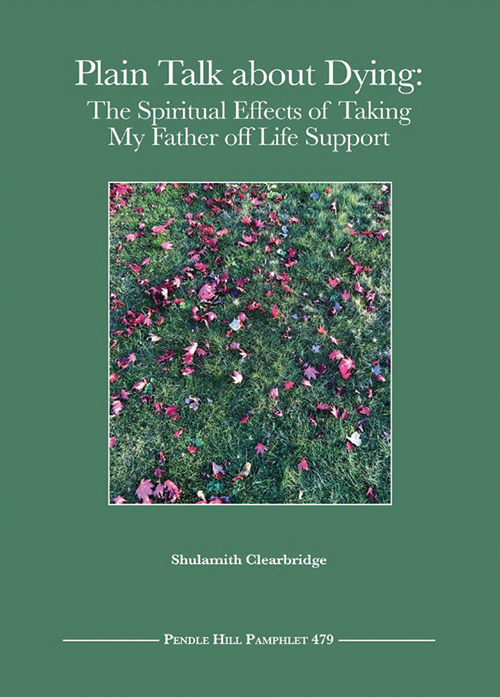
Plain Talk about Dying: The Spiritual Effects of Taking My Father off Life Support
Reviewed by Brad Sheeks
October 1, 2023
By Shulamith Clearbridge. Pendle Hill Pamphlets (number 479), 2023. 31 pages. $7.50/paperback or eBook.
Imagine this: Your father is in the hospital dying of congestive heart failure. His life is being extended by the use of a respirator. At the bedside are your mother, your brother, his wife, and yourself. The doctor is recommending discharge to a nursing facility. Your father said he would never go to a nursing home but didn’t have an advance directive. But here you are. Someone has to make the decision. Your mother agrees to be the one, but your brother wants a second opinion. She changes her mind and asks you to be responsible for the decision. You agree. He dies, and you’re crushed with guilt. You killed your father!
Shulamith Clearbridge tells her story in the Pendle Hill pamphlet Plain Talk about Dying: The Spiritual Effects of Taking My Father off Life Support. She explores issues under these headings: “Between a Rock and a Hard Place”; “The Decision”; “Letting Go”; “Death”; “Guilt”; “Working through the Trauma”; “Spiritual Repercussions: Love, Forgiveness”; and “Transformations.”
Clearbridge’s father had not been clear about his last wishes except to not go to a nursing home. The hospital needed to discharge him, but caring for him at home was not an option for the family. He was going to die. No one was willing to have the oxygen shut off as long as her brother opposed doing so. But when he finally agreed, it was she who had the responsibility for ending her father’s life. Later, a friend wrote to Clearbridge of stories of the Greek god who suffered for doing the right thing. It was poor, old Prometheus. What a mensch!
It occurs to me as a reader that the underlying tragedy of this story is that her father was ambiguous about his last wishes. He wanted to live but had an aversion to nursing homes, leaving the family without clear instructions. It reminds me a little of Woody Allen’s alleged quip, “I am not afraid of death; I just don’t want to be there when it happens.”
Clearbridge and her family had to be there through 17 years of caring for her father and then through those last fraught days at the hospital. She felt she was a murderer, broken by what she had done.
She identified with a Jewish prayer, echoing Psalm 143:3–4:
For this anguish has pursued my soul;
It crushes to the ground my life;
I dwell in darkness, as those that are dead eternally.
And my spirit within me is overwhelmed; my heart is shocked.
How one finds a path out of this dark wood is a question many of us have had occasion to explore. It is an intense spiritual enterprise. Clearbridge writes that healing from the experience of taking her father off life support began with her talking with supportive friends, which went well for a while but then began to give her the impression that it was time to move on with life. But she wasn’t ready, not even close.
Writing out your grief is a tried-and-true method, particularly when done with the support of a small group. Clearbridge found that writing was the most healing thing she could do. She reports that she has come to greater compassion for others in similar situations. She remembers a line from another Jewish prayer: “We see that love abides, the soul abides, as You abide.”
Clearbridge ends her story with these words:
Now, six years later, the way my father died is a serious thing, a weighty thing, but it no longer jabs at my heart. I live with it. I expect it will recede eventually after my mother’s death. I pray that if someone must decide if it is her time—and that person is not me—that they will be merciful.
A short afterword following that prayer reports that Clearbridge’s mother died at home on hospice shortly after the writing of those last words.
This story is painful reading since it has such a raw texture to it. Clearbridge shows us how she found help with her grieving, but she was not up for the responsibility of ending a life. If I may indulge in a bit of wishful thinking, I would hope for more help in framing the experience itself of shutting off the oxygen as part of the spiritual journey. That said, this is not a how-to manual of advice; she’s just telling her story. There is, however, an interesting set of questions on the last page that would work very well as prompts for group discussion and sharing. I like the last one: “What spiritual lessons have you learned from grieving?”
Brad Sheeks is a member of Newtown (Pa.) Meeting. He is retired from hospice nursing. He is also retired as a co-leader (with Pat McBee) of couples retreats for the Friends General Conference (FGC) Couple Enrichment Program.



Comments on Friendsjournal.org may be used in the Forum of the print magazine and may be edited for length and clarity.